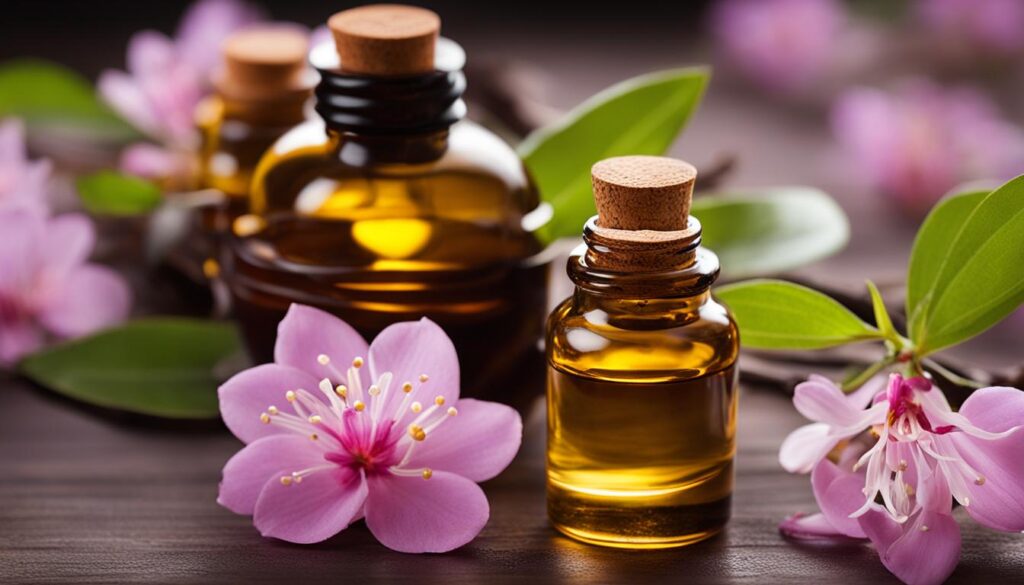Sandalwood oil, derived from the Santalum album tree, has a rich history of use in traditional medicine and aromatherapy. This exquisite oil is beloved for its unique scent and numerous potential health benefits. While many of its traditional uses have yet to undergo scientific testing, research suggests that sandalwood oil may possess anti-inflammatory, anti-anxiety, wound healing, and anti-cancer properties. As a result, it has found applications in perfumes, skincare products, and the practice of aromatherapy.
Key Takeaways:
- Sandalwood oil has a long history of use in traditional medicine and aromatherapy.
- Research suggests that sandalwood oil may possess anti-inflammatory, anti-anxiety, wound healing, and anti-cancer properties.
- It is commonly used in perfumes, skincare products, and for aromatherapy purposes.
Traditional Uses of Sandalwood Oil

Sandalwood oil has been utilized for centuries in traditional medicine, particularly in Ayurvedic medicine and Chinese medicine. It has a rich history of various traditional uses, spanning from treating common colds and urinary tract infections to addressing liver and gallbladder problems, digestive issues, muscle conditions, mental disorders, hemorrhoids, and even scabies. Additionally, sandalwood oil is highly valued for its exquisite scent, making it a popular ingredient in perfumes and a staple in the world of aromatherapy.
Aromatic applicability aside, let’s delve into the historical significance of sandalwood oil in Ayurvedic medicine and Chinese medicine. In Ayurveda, an ancient Indian holistic healing system, sandalwood oil is regarded as a therapeutic essential oil with an array of medicinal properties. It has been traditionally used to restore physical and emotional balance, ease anxiety and stress, enhance cognitive function, and promote overall wellbeing. In Chinese medicine, sandalwood oil has been applied to treat ailments related to the liver and digestive system. It is believed to aid in reducing liver inflammation, improving digestion, and alleviating associated discomfort.
Furthermore, sandalwood oil is often revered for its spiritual and grounding properties, making it an integral part of religious ceremonies, meditation practices, and yoga sessions. Its distinct aroma is said to promote tranquility, calm the mind, and uplift the spirit.
As we explore the traditional uses of sandalwood oil, it becomes evident that its historical significance and multifaceted applications continue to captivate modern-day enthusiasts.
Research on Sandalwood Oil

While scientific research on the health benefits of sandalwood oil is limited, there have been studies suggesting its potential advantages. These studies indicate that sandalwood oil may possess anti-inflammatory properties, aid in anxiety management, support wound healing, and even show promise in fighting skin cancer.
One research study found that sandalwood oil exhibited anti-inflammatory effects, specifically in the context of skin disorders. The oil was observed to reduce inflammation, offering potential relief for individuals suffering from conditions such as eczema or psoriasis.
Additionally, several studies have investigated the impact of sandalwood oil on anxiety levels. The findings suggest that the aroma of sandalwood can help promote relaxation and have a calming effect, potentially aiding in anxiety management.
Sandalwood oil has also been explored for its wound healing properties. Research indicates that sandalwood oil may promote skin cell growth, which can accelerate the healing process.
Furthermore, there is emerging research suggesting that sandalwood oil could be effective in fighting skin cancer. Studies have shown that the oil may contribute to cell death in cancerous cells, potentially offering a novel approach to skin cancer treatment.
It is important to note that while these initial findings are promising, further research is needed to confirm these effects and explore additional potential benefits of sandalwood oil.
| Benefit | Research Findings |
|---|---|
| Anti-inflammatory effects | Reduces inflammation in skin disorders |
| Anxiety management | Has a calming effect, promotes relaxation |
| Wound healing | Promotes skin cell growth |
| Anti-cancer properties | Contributes to cell death in cancerous cells |
Choosing High-Quality Sandalwood Oil
When it comes to purchasing sandalwood oil, it’s crucial to select authentic, high-quality products. With the rising demand for this precious oil, there are synthetic alternatives flooding the market. To ensure that you are getting the real deal, follow these tips:
- Check the label: Look for indications that the oil is not synthetic, such as “scented oil” or “perfumed oil.” This will help you determine if the product is derived from the Santalum album tree, which yields genuine sandalwood oil.
- Minimum free alcohol level: Authentic sandalwood oil should have a minimum free alcohol level of 90%. This purity test ensures that you are getting a high-quality product with maximum therapeutic benefits.
By being vigilant and examining these factors, you can confidently select high-quality, authentic sandalwood oil for your needs.
Practical Uses of Sandalwood Oil

Sandalwood oil is a versatile and valuable addition to any home, offering a wide range of uses. From skincare benefits to aromatherapy, this essential oil can enhance your well-being and create a soothing environment. Let’s explore the practical ways in which you can incorporate sandalwood oil into your daily life.
Sandalwood Oil for Skincare
When it comes to skincare, sandalwood oil offers numerous benefits. It can be used to moisturize the skin, balance complexion, and promote hair health. To moisturize your skin, mix a few drops of sandalwood oil with a carrier oil like jojoba or coconut oil, and gently massage it onto your face and body. Its hydrating properties will leave your skin feeling nourished and revitalized.
For haircare, add a few drops of sandalwood oil to your shampoo or conditioner, or apply it directly to wet hair. This can help promote moisture retention, improve hair texture, and leave your locks looking shiny and healthy.
Sandalwood Oil in Aromatherapy
Aromatherapy is a popular practice for relaxation and mood enhancement. Sandalwood oil is frequently used in aromatherapy due to its calming and grounding effects. Diffusing sandalwood oil in your living space or using it during meditation can create a serene and tranquil ambiance, helping to reduce stress and anxiety.
If you’re using an essential oil diffuser, add a few drops of sandalwood oil to the water and allow the fragrance to fill the room. Alternatively, you can heat a kettle of water and add a few drops of the oil, creating a fragrant steam that will scent your home.
Using Sandalwood Oil at Home
Sandalwood oil can be easily incorporated into your daily routine. Here are some practical ways to use it:
“A little bit of sandalwood oil goes a long way in enhancing your skincare and home ambiance. Embrace the numerous benefits this versatile oil has to offer.” – Jane Smith, Aromatherapy Expert
- Add a few drops of sandalwood oil to your favorite unscented lotion or body butter for a subtly fragranced moisturizer.
- Create a soothing and relaxing bath by mixing a few drops of sandalwood oil with Epsom salts before adding it to your warm bathwater.
- Prepare a homemade facial mask by combining sandalwood oil with ingredients like clay, honey, or yogurt. Apply the mask to your face and leave it on for 10-15 minutes before rinsing off.
- Blend sandalwood oil with a carrier oil like almond or grapeseed oil to create a luxurious massage oil.
- Add a few drops of sandalwood oil to a spray bottle filled with water and use it as a natural air freshener for your home.
It is important to note that essential oils, including sandalwood oil, can cause skin irritation or allergic reactions in some individuals. Before using larger amounts of sandalwood oil, perform a patch test by applying a small amount to your forearm and observing for any adverse reactions. If you experience any discomfort, discontinue use.
In conclusion, sandalwood oil offers practical and effective uses for both skincare and aromatherapy. By incorporating this versatile oil into your daily routine, you can experience its soothing and rejuvenating benefits. Whether you’re looking to moisturize your skin, enhance the atmosphere of your living space, or promote relaxation, sandalwood oil is a natural and fragrant solution.
Tips for Using Sandalwood Oil

When it comes to using sandalwood oil, there are a few important tips to keep in mind. These tips will help ensure that you experience the maximum benefits while minimizing the risk of any potential adverse effects.
- Dilute with a carrier oil: Before applying sandalwood oil to your skin, it is recommended to dilute it with a carrier oil. This can help prevent skin irritation and sensitivity. Some popular carrier oil options include almond oil, coconut oil, or jojoba oil.
- Perform a patch test: Before using larger amounts of sandalwood oil, it is essential to perform a patch test. Apply a small amount of diluted oil to a small area of your skin and wait for 24 hours to check for any allergic reactions or irritations.
- Store properly: To preserve the quality and potency of sandalwood oil, store it in a cool, dark place. This will help prevent oxidation and maintain its therapeutic properties for a longer period.
- Consult with a healthcare provider: If you are pregnant, nursing, or under a doctor’s care, it is important to consult with your healthcare provider before using sandalwood oil. They can provide personalized advice and ensure it is safe for your specific circumstances.
By following these tips, you can effectively incorporate sandalwood oil into your daily routine and enjoy its numerous benefits while ensuring your safety and well-being.
Sandalwood Oil Cautions and Side Effects
While sandalwood oil is generally safe to use, there are a few cautions and potential side effects to be aware of:
“Although sandalwood oil is considered safe for most individuals, it is always recommended to perform a patch test and consult with a healthcare provider before using it, especially if you have a history of allergies or skin sensitivities.”
Some individuals may experience skin irritation or allergic reactions when using sandalwood oil. It is essential to discontinue use if any adverse reactions occur. Additionally, sandalwood oil should not be ingested without proper guidance from a healthcare professional.
Always use sandalwood oil as directed and in moderation. If you experience any concerning symptoms or side effects, seek medical attention immediately.
Benefits of Sandalwood Oil for Haircare

Sandalwood oil is not only beneficial for skincare and aromatherapy, but it can also have positive effects on hair health. Its moisturizing properties make it a versatile ingredient for promoting hair moisture and shine. Whether added to hair products or applied directly to wet hair, sandalwood oil can help improve the texture and lustre of your locks, leaving them looking and feeling healthy.
Moisturizes Hair
The hydrating properties of sandalwood oil make it an excellent natural moisturizer for the hair. By deeply penetrating the hair shaft, it helps to restore moisture and prevent dryness, which can lead to brittleness and breakage. Regular use of sandalwood oil can keep your hair adequately hydrated, resulting in softer and more manageable locks.
Enhances Hair Shine
Do you want shiny, glossy hair? Look no further than sandalwood oil. When applied to the hair, it forms a protective barrier that seals in moisture and reflects light, giving your hair a brilliant shine. With regular use, sandalwood oil can help restore vitality and luster to dull, lifeless hair, making it appear radiant and healthy.
Methods of Application
There are several ways to incorporate sandalwood oil into your haircare routine. You can add a few drops of the oil to your shampoo or conditioner and use it as you normally would. This allows the oil to be evenly distributed throughout your hair, providing moisture and shine with each wash.
If you prefer a more concentrated application, you can apply sandalwood oil directly to wet hair after shampooing. Simply massage a small amount of oil into your scalp and along the length of your hair. Leave it on for a few minutes before rinsing thoroughly.
Note: It is always recommended to perform a patch test before using any new hair or skincare product to check for any allergic reactions.
Sandalwood Oil Haircare Routine
To make the most of the benefits of sandalwood oil for your hair, you can follow this simple routine:
- Wash your hair with your preferred shampoo.
- Add a few drops of sandalwood oil to your conditioner and apply it from the mid-length to the ends of your hair. Leave it on for a few minutes before rinsing.
- Gently towel-dry your hair and apply a small amount of sandalwood oil to your damp hair. Start from the ends and work your way up to the roots.
- Style your hair as usual.
- For additional shine and protection, you can apply a few drops of sandalwood oil to your hair before using heat styling tools.
Benefits of Sandalwood Oil for Haircare
| Benefits | Description |
|---|---|
| Moisturizes Hair | Deeply hydrates and prevents dryness, improving hair texture and manageability. |
| Enhances Hair Shine | Forms a protective barrier that seals in moisture and reflects light, giving hair a brilliant shine. |
| Improves Hair Health | Restores vitality and luster to dull, lifeless hair, making it appear healthy and radiant. |
By incorporating sandalwood oil into your haircare routine, you can enjoy the benefits of healthier, shinier hair. Whether added to your favorite hair products or used as a stand-alone treatment, sandalwood oil can be a natural and effective solution for improving the overall health and appearance of your hair.
Sandalwood Oil for Aromatherapy and Relaxation

Sandalwood oil is highly valued in aromatherapy for its grounding and calming effects. Its unique scent can help promote relaxation, reduce feelings of stress and anxiety, and enhance the overall mood. Whether diffused in the bedroom or used during meditation, sandalwood oil creates a soothing and peaceful environment.
Incorporating sandalwood oil into your aromatherapy routine can have a profound impact on your well-being. The therapeutic properties of sandalwood oil make it an excellent choice for those seeking natural remedies for stress relief and relaxation.
The calming scent of sandalwood oil can help quiet the mind and induce a sense of tranquility. It has been used for centuries to promote a deep sense of relaxation and alleviate feelings of tension. By incorporating sandalwood oil into your daily self-care routine, you can create a serene and harmonious atmosphere, allowing you to unwind and find inner peace.
One of the most effective ways to enjoy the benefits of sandalwood oil for relaxation is through a diffuser or essential oil burner. By adding a few drops of sandalwood oil to water, you can fill your space with its soothing aroma in mere minutes. As you inhale the gentle fragrance, you’ll feel your stress levels decrease, and a sense of calm wash over you.
For those who prefer a more hands-on approach, sandalwood oil can also be diluted with a carrier oil and applied topically. Gently massaging the oil into the skin can provide a deeply relaxing and rejuvenating experience. This method is particularly effective when applied to pulse points, such as the wrists or the back of the neck.
In addition to its relaxation benefits, sandalwood oil can also aid in achieving a state of mental clarity and focus during meditation. Its grounding properties help to quiet mental chatter and create a centered and peaceful mindset. By incorporating sandalwood oil into your meditation practice, you can deepen your sense of mindfulness and enhance your overall experience.
Experience the calming and grounding effects of sandalwood oil for yourself. Add it to your aromatherapy routine, and enjoy the benefits of relaxation, stress relief, and a renewed sense of calm.
Key Benefits of Sandalwood Oil for Aromatherapy and Relaxation:
- Promotes relaxation and reduces stress and anxiety
- Enhances mood and creates a sense of tranquility
- Improves mental clarity and focus during meditation
- Creates a soothing environment for relaxation and self-care
| Sandalwood Oil for Aromatherapy and Relaxation | Benefits |
|---|---|
| Promotes relaxation | Reduces stress and anxiety |
| Enhances mood | Creates a sense of tranquility |
| Improves mental clarity | Focus during meditation |
| Creates a soothing environment | For relaxation and self-care |
Selection and Storage of Sandalwood Oil

When it comes to selecting sandalwood oil, authenticity and quality are paramount. To ensure you’re purchasing a genuine product derived from Santalum album, be sure to check the label for indications of authentic sandalwood oil. Look out for terms like “100% pure,” “organic,” and “derived from Santalum album.” Avoid products labeled as “scented oil” or “perfumed oil,” as these are likely synthetic alternatives.
Proper storage is crucial for maintaining the quality and shelf life of sandalwood oil. It should be stored in a cool, dark place away from direct sunlight and heat sources. Exposure to light and heat can cause degradation and reduce the potency of the oil. Consider storing it in a tightly sealed, amber glass bottle to protect it from external factors.
Here are some key tips for storing sandalwood oil:
- Keep the oil in a cool and dark place, such as a medicine cabinet or a drawer.
- Avoid storing sandalwood oil in the bathroom or near windows where it can be exposed to heat and light.
- Ensure the bottle is tightly sealed to prevent air and moisture from entering.
- Consider using an amber glass bottle to protect the oil from light.
“Selecting and storing sandalwood oil properly is crucial to ensure you’re getting an authentic and high-quality product. By following these guidelines, you can maximize the therapeutic benefits and prolong the shelf life of your sandalwood oil.”
Summary and Conclusion
In summary, sandalwood oil has been widely used for centuries in traditional medicine, aromatherapy, and skincare. While scientific research on its benefits is limited, studies suggest that sandalwood oil may possess anti-inflammatory, anti-anxiety, wound healing, and anti-cancer properties. This versatile oil is commonly found in perfumes, skincare products, and is highly valued for its calming effects in aromatherapy.
When incorporating sandalwood oil into your routine, it is crucial to select authentic, high-quality products. Look for indications on the label that it is derived from Santalum album and avoid synthetic alternatives. Additionally, ensure proper usage by diluting the oil with a carrier oil, performing a patch test, and following storage guidelines to maintain its quality.
Although more research is needed to fully understand the potential benefits of sandalwood oil, its historical uses and anecdotal evidence highlight its significance. Whether you are seeking relief from inflammation, stress reduction, or improved skincare, sandalwood oil offers a natural and aromatic solution worth exploring.
FAQ
What are the traditional uses of sandalwood oil?
Sandalwood oil has been used in Ayurvedic medicine and traditional Chinese medicine for centuries. It has been traditionally used to treat a variety of conditions, including the common cold, urinary tract infections, liver and gallbladder problems, digestive problems, muscle problems, mental disorders, hemorrhoids, and scabies. Additionally, sandalwood oil has been valued for its scent in perfumes and its use in aromatherapy.
What research has been done on the benefits of sandalwood oil?
While there is limited scientific research on the health benefits of sandalwood oil, some studies have suggested that it may have anti-inflammatory effects, help manage anxiety, support wound healing, and fight skin cancer. These studies have shown that sandalwood oil may reduce inflammation in skin disorders, decrease anxiety levels, promote skin cell growth, and contribute to cell death in cancerous cells. However, more research is needed to confirm these findings and explore other potential benefits of sandalwood oil.
How can I choose high-quality sandalwood oil?
When purchasing sandalwood oil, it is important to look for authentic, high-quality products. To ensure the oil is derived from Santalum album, check the label for indications that it is not a synthetic product, such as “scented oil” or “perfumed oil.” Authentic sandalwood oil should have a minimum free alcohol level of 90%. Due to high demand and limited supply, there are synthetic products on the market, so it is important to be vigilant when selecting sandalwood oil.
How can I use sandalwood oil at home?
Sandalwood oil can be used in various ways at home. It can be added to lotions, used to scent the home by heating it in a kettle of water or using an essential oil infuser, or mixed with a carrier oil for topical application. It is commonly used in aromatherapy to promote relaxation and enhance mood. In skincare, sandalwood oil can be used to moisturize the skin, balance complexion, and promote hair health. It is important to perform a patch test before using larger amounts of sandalwood oil, as some people may be allergic to essential oils.
What tips should I follow when using sandalwood oil?
When using sandalwood oil, it is recommended to dilute it with a carrier oil before applying it to the skin. This can help prevent skin irritation. It is also important to perform a patch test before using larger amounts to check for any allergic reactions. Sandalwood oil should be stored in a cool, dark place to preserve its quality. Additionally, pregnant women, nursing mothers, and individuals under a doctor’s care should consult with their healthcare provider before using sandalwood oil.
How can sandalwood oil benefit haircare?
Sandalwood oil can benefit hair by promoting moisture and shine. It can be added to shampoo or conditioner or applied directly to wet hair. The moisturizing properties of sandalwood oil can help improve the texture and lustre of the hair, leaving it looking healthy and nourished.
How is sandalwood oil used in aromatherapy and relaxation?
Sandalwood oil is highly valued in aromatherapy for its grounding and calming effects. Its unique scent can help promote relaxation, reduce feelings of stress and anxiety, and enhance the overall mood. It can be diffused in the bedroom or used during meditation to create a soothing and peaceful environment.
How should I select and store sandalwood oil?
When selecting sandalwood oil, it is important to choose authentic, high-quality products. Checking the label for indications of authentic sandalwood oil derived from Santalum album is recommended. It is also important to store sandalwood oil in a cool, dark place to maintain its quality and prolong its shelf life.






